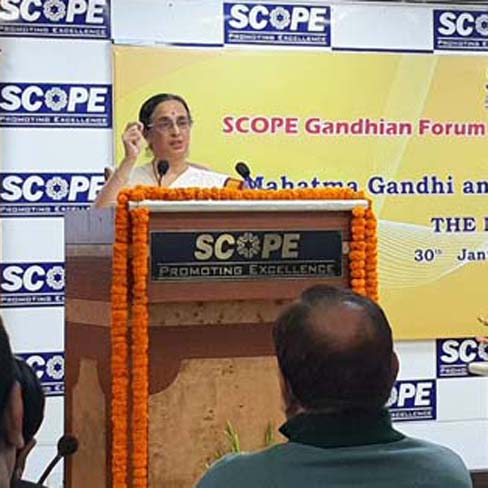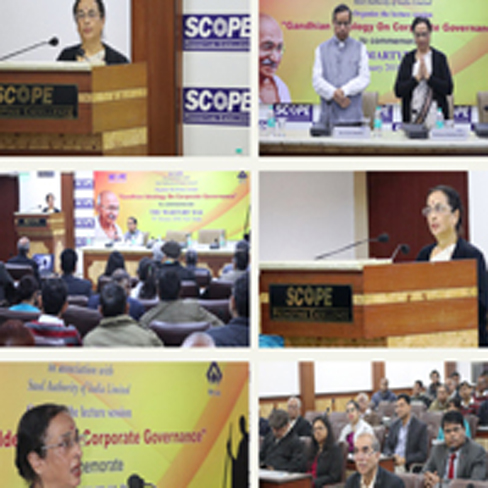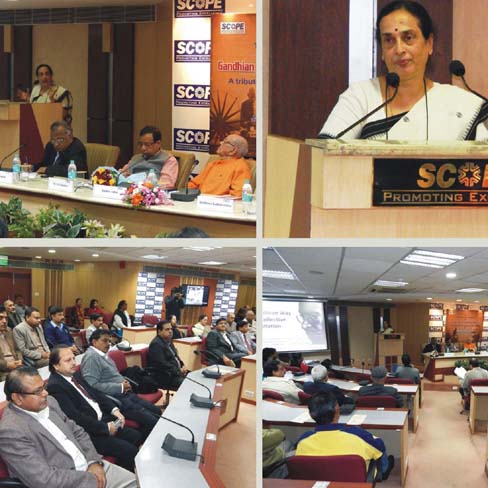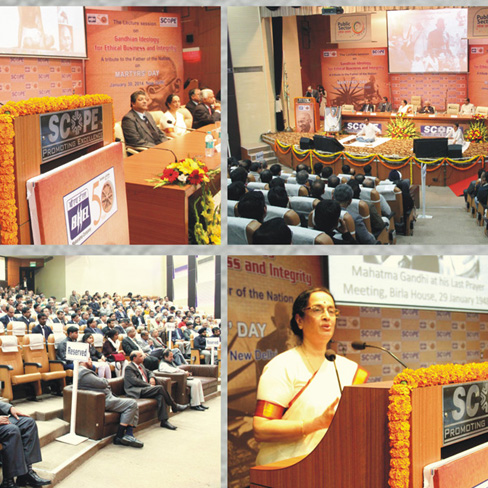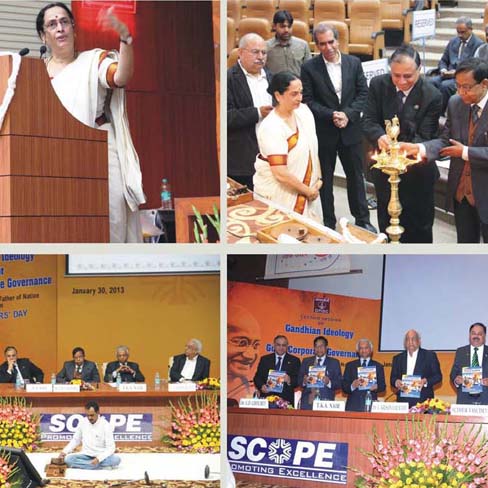Proposal for Integration of the ‘Gandhian Forum for Ethical Corporate Governance’ Aligned with Guidelines on ‘Corporate Social Responsibility and Sustainability’ for Central Public Sector Enterprises.
The ‘Gandhian Forum for Ethical Corporate Governance’ facilitated by SCOPE envisages a role in sensitizing the employees of CPSEs to develop the values of transparency, accountability, individual probity and commitment to meet rising expectations from diverse stakeholders and to act as a pivot point to promote attitudinal change for ethical business practices
The revised CSR guidelines issued by DPE effective from 1st April 2013 also emphasises that there is a need to promote organisational integrity, ethical business practices and capacity building program by imparting training to the internal stakeholders/employees of CPSEs.
It states the CPSEs shall take steps to implement their CSR agenda within the organisation through the active involvement of the employees, who are important internal stakeholders (Point 1.6.3). The internal stakeholders are to be sensitised regarding the need to adopt ethical business practices for the desired attitudinal change (Point1.10.4) and for applying the CSR and Sustainability agenda.
According to the guidelines, ethical conduct of business lies at the core of responsible business. To promote organisational integrity it is essential that premium is placed on the following individual probity of employees; transparency in all activities, dealings and transactions is encouraged; unethical, corrupt and anti-competition practices are discouraged; temptation of quick returns and marginal gains in business through questionable means is resisted; positions and situations that give rise to possible conflict of interest are avoided (Point 1.3.15).
All these Ideologies emphasised in the DPE guidelines and stated in Global Business Ethics documents have been said and demonstrated by Mahatma Gandhi. The key dimensions of the ‘Gandhian Forum’ focuses on the priority of ethics and values at work, transparency, accountability, setting higher standards of leadership, humane approach to conflict resolution and carrying out the societal responsibility.
Point 1.3.8 of the guidelines provide the indications that the philosophy and spirit of corporate social responsibility and sustainability should get embedded in the core values of all the CPSEs, be imbibed by the employees at all levels and it should permeate into all the activities, processes, operations and transactions of the enterprise.
The ‘Gandhian Forum’ provides learning to all levels of executives so that they are able to have insight into the ethical business environment with a pro change mind set. It strives to promote appropriate facilitation and empowerment to develop the capability to deal with clarity of issues with a new mind set and outlook.
Point 1.3.1 of the guidelines mention that ‘Corporate Social Responsibility and Sustainability is a company’s commitment to its stakeholders to conduct business in an economically, socially and environmentally sustainable manner that is transparent and ethical’ for practices of doing business, and adopting motivational tools to provide just the right momentum to push all such initiatives as per the UN Global Compact Principles. The Gandhian Forum’s commitments are aligned to the universal principles in the areas of human rights, labour, environment, business ethics and anti-corruption for corporate sustainability.
Point 1.6.2 the guidelines reiterate that the mandate of a company is to conduct its business in a socially responsible way by maintaining high level of organisational integrity and ethical behaviour; conforming to the expected standards of transparency in reporting and disclosing its performance in all the spheres of its activities; demonstrating concern for the welfare of its employees; adopting production methods, commercial operations and management practices that promote social and environmental sustainability; and, retaining the trust and confidence of the investors and shareholders by matching its financial performance with equally commendable achievements in non-financial parameters
To meet the objectives of the CSR guidelines of sensitizing and training the internal stakeholders of the CPSEs, the ‘Gandhian Forum’ proposes to undertake activities like training, workshop, seminar by engaging with CPSEs in bringing about certain attitudinal change in different levels of stakeholders suited to their requirement and aligned to business environment.
The CSR guidelines stipulate that the expenditure incurred on capacity building programs such as training, workshops, seminars, conferences, etc. and on corporate communication strategies for engagement of all stakeholders, whether internal or external, to implement the CSR and Sustainability agenda of a company, would be accounted for as CSR and Sustainability expenditure from the budget allocated for this purpose (Point 1.5.8) it is expected that the activities of the ‘Gandhian Forum’ may be integrated under this point.
In order to apply the guidelines mentioned in the CSR and Sustainability agenda document it is imperative that the cross section of internal stakeholders are repeatedly sensitized and followed up to bring about some attitudinal change to act on the utility aspect of ethical business practices.
FOR WHOM:.
METHODOLOGY:.
For capacity building workshops (at corporate and Inter-corporate level) for sensitizing the internal stakeholders / employees of CPSEs on utility aspect of ethical business practices and organisational integrity
DURATION: .
The Schedule provided is tentative and can be modified according to the objectives and requirement of individual CPSE.
OUTCOME:.
More than 86 years ago Mahatma Gandhi had advised Indian business leaders that ‘the value of an industry should be gauged less by the dividend it pays to shareholders than by its effect on the bodies, soul and spirits of the people employed in it.

